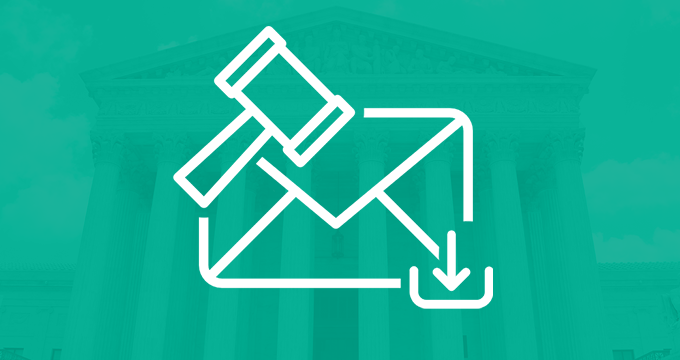When email became the new standard for communication, this presented the world with a new challenge — regulating how financial services firms manage their email.
The solution came in the form of comprehensive email archiving of all communication records with specific laws regulating the financial sector.
Today, most regulated financial services firms are required to establish supervisory policies, implement safeguards to protect client record privacy, monitor accuracy of disclosures and authorize any alterations.
In this article we’ll explore the key laws and compliance-related challenges in the financial services industry:
- The impact of the Dodd-Frank Act.
- Financial email archiving challenges.
- Importance of email archiving.
How the Dodd-Frank Act Changed the Financial Services Industry
Before the Dodd-Frank Act, there had been laws in place that required financial services firms to archive all data related to specific financial transactions and activities.
In theory, regulatory bodies could examine if the company violated any laws and regulations.
On the surface, everything seemed to be working. However, glaring issues were uncovered after the financial crash of 2008 and exposed many vulnerabilities in financial regulations.
In response, the Dodd-Frank Act was enacted in 2010 emerging as a comprehensive legislative overhaul to the whole system, aiming to address the root cause of the financial crash.
The four cornerstones of the Dodd-Frank Act were:
- Financial stability oversight — A special council was created to monitor the financial stability of major financial firms whose downfall could have huge effects on the economy.
- Volcker rule — Minimizes risk-taking by restricting banks from engaging in proprietary trading and limiting investments in hedge funds.
- Consumer protection — The Consumer Financial Protection Bureau (CFPB) protects consumers from predatory financial practices.
- Whistleblower program — Strengthened the whistleblower program enacted by the Sarbanes-Oxley.
After its enactment, the financial service industry became much stricter in every aspect including how firms store and manage their communications.
Specific regulations like FINRA and SEC Rule 17a-4 became the new standard requiring financial service firms to prove their business is being conducted properly and their data is archived in accordance with the law.
Financial Email Archiving Challenges
While every business comes with certain challenges, those in the financial industry face some of the toughest ones, especially after the fear of another financial crisis.
There are extensive regulations governing the industry and most of them affect the way that IT managers manage email archiving.
The financial industry has to abide by many legislations and governing bodies:
- FINRA — Oversees the responsibilities of financial services firms and broker-dealers toward the government requiring them to keep comprehensive records of all transactions and communications.
- Sarbanes-Oxley — Protects investors from fraudulent financial reports requiring enhanced financial reporting and retention of all electronic records while preventing their alteration and deletion.
- Gramm-Leach-Bliley — Monitors and controls the ways financial institutions handle sensitive private information of individuals.
- Patriot Act — Designed to combat terrorism by enhancing the government’s ability to monitor financial transactions, particularly relating to money laundering and funding terrorism.
The key point in all of these regulations is the retention of transactions and electronic records from every channel they’re communicated through.
Because email was the main channel, it meant financial firms needed to archive all of their email data.
This presented five key challenges to overcome:
- Record management — Retention of all email communication according to defined retention policies to meet compliance with different regulations.
- Data protection — Protection of both transactional and communications data organization-wide.
- Ediscovery — Obligation to deliver substantial communications records as evidence in legal inquiries.
- Increased costs — Rising costs due to the need for additional IT staff, powerful email servers, and email archiving systems.
- Employee awareness — Ensuring that employees are well informed and trained to adhere to email archiving policies and regulations.
The Importance of Email Archiving in the Financial Industry
With the introduction of the Dodd-Frank Act and the strictness of electronic communications laws, email archiving has become mandatory for all financial services organizations.
Financial email archiving single handedly solves the problems with compliance, DLP, legal discovery, and employee monitoring.
Regulatory compliance
Financial institutions have to abide by strict data retention and protection laws like FINRA, SOX, and GLBA, which all require them to retain records for different periods of time.
Modern archiving solutions automatically capture and retain all email messages, both incoming, outgoing, and internal, with all the necessary metadata and attachments in a centralized repository.
These records are put under retention policies for a prolonged period, allowing businesses to retain them for however long they need to.
Data protection
Instead of keeping email on their primary email servers or individual PST files, email archives are a separate entity meant to protect your data.
With modern encryption technology, archive administrators, and adequate employee training, financial firms can be assured that their data won’t fall into the wrong hands or be lost.
Ediscovery
Email records are more important than ever in the eyes of the law, especially in the financial industry where one message can change everything.
Financial institutions are required to deliver emails as evidence in a short amount of time when called upon by the court, however, this used to be very costly and hard.
In the past, financial businesses had to hire external parties to go through thousands of conversations to find the right evidence.
However, now, with archiving, organizations can search through huge databases of email conversations in minutes and find evidence by using advanced filters and putting those messages on legal hold if they anticipate litigation.
Employee monitoring
The financial services industry has the highest incidence of employee theft and internal fraud cases, so there has to be some kind of monitoring and oversight over the employees.
Email correspondence is involved in most internal crimes and employee misconduct cases.
Modern archives allow administrators to detect these crimes before they happen through keyword notifications, alerts, and email flagging.
Cost-effectiveness
Since the introduction of the Dodd-Frank Act compliance costs have gone up by at least 20% for many banks and financial institutions.
However, email archiving solutions remain a cost-effective way to retain huge amounts of data for long periods.
Along with storage, they allow for the deduplication of data, better storage management, and lower costs of ediscovery.
Solve all of your email archiving and ediscovery needs with Jatheon’s cloud archiving solution built for businesses of all sizes. Stay compliant, speed up your ediscovery, and retain all of your business data in one easy-to-use solution.
Read Next:How To Meet FINRA Compliant and Retain Records How To Archive Bloomberg Messages for Compliance The Importance of Email Archiving – 18 Reasons to Archive Email |








